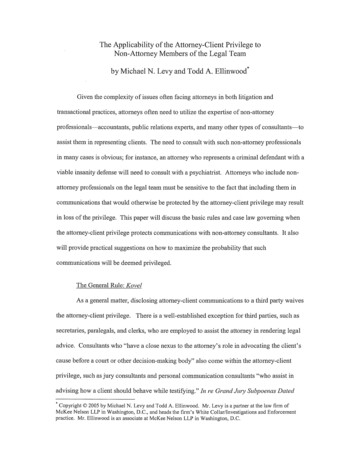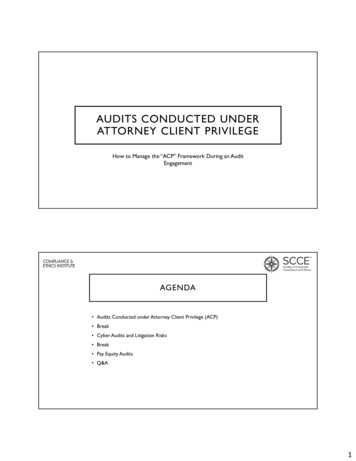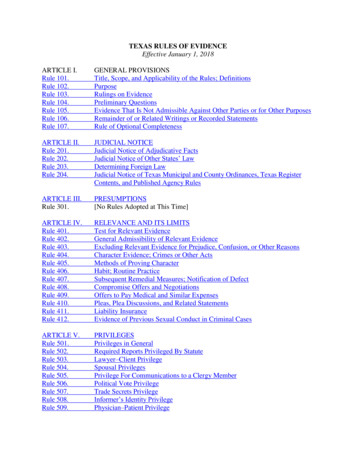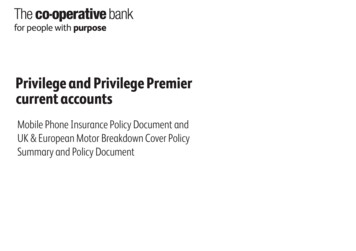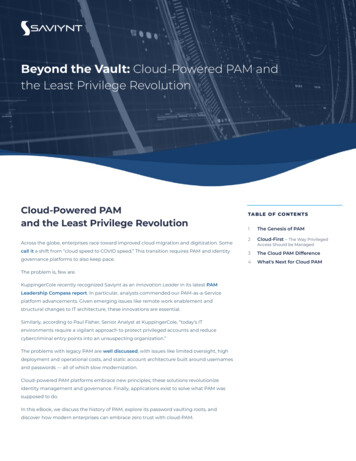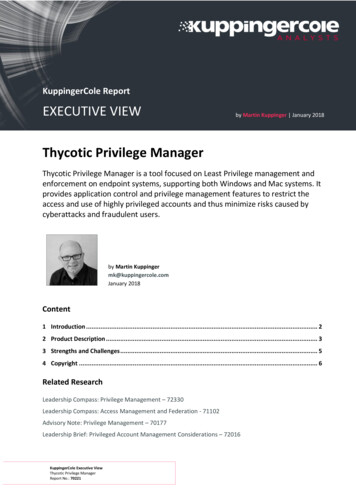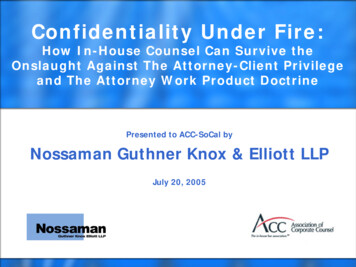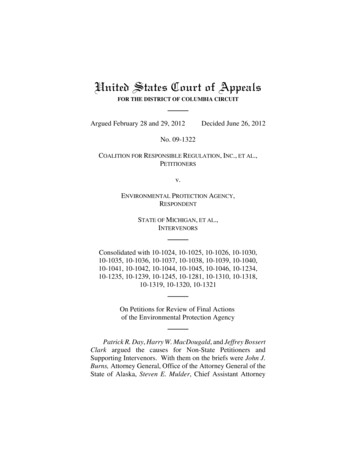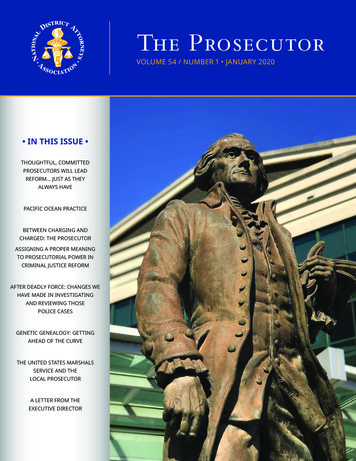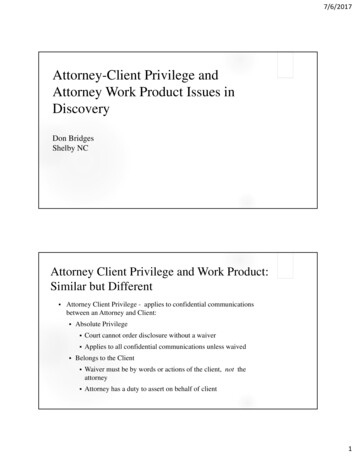
Transcription
7/6/2017Attorney-Client Privilege andAttorney Work Product Issues inDiscoveryDon BridgesShelby NCAttorney Client Privilege and Work Product:Similar but Different Attorney Client Privilege - applies to confidential communicationsbetween an Attorney and Client: Absolute Privilege Court cannot order disclosure without a waiver Applies to all confidential communications unless waivedBelongs to the Client Waiver must be by words or actions of the client, not theattorney Attorney has a duty to assert on behalf of client1
7/6/2017Attorney Client Privilege and WorkProduct: Similar but Different Attorney Work Product A Qualified Immunity, not an absolute privilege Party seeking the information has substantial need of the materials in preparation of thecase and Party is unable without undue hardship to obtain the equivalent of the information byother means.But- the Court may not permit disclosure of mental impressions, conclusions, opinions orlegal theories of an attorney or other representative of a party (with one exception).Protects “materials prepared in anticipation of litigation” May be released upon showing that:By counsel consultant, surety, indemnitor, insurer or agentWork Product does not protect materials prepared in the regular course of businessWhat is the Purpose of Protecting theAttorney Client Privilege and AttorneyWork Product? Attorney Client Privilege: the belief that only “full and frank”communications between attorney and client allow the attorney toprovide the best counsel benefits out-weighing the risks of truthfinding posed by barring full disclosure in court In re Death ofMiller, 357 NC at 329. Work Product: “discovery was hardly intended to enable a learnedprofession to perform its functions wither without wits or on witsborrowed from the adversary.” Hickman v. Taylor, 329 US 495,516 (1947).2
7/6/2017Attorney-Client Privilege: Elements1. The relationship of attorney and client existed when the communicationwas made;2. The communication was made in confidence;3. The communication concerns a matter about which the attorney is beingprofessionally consulted;4. The communication was made in the course of giving or seeking legaladvice for a proper purpose, although litigation need not be contemplated; and5. The client has not waived the privilege.(The burden is on the party asserting the privilege to demonstrate each of itsessential elements.)In re Investigation of Death of Miller, 357 N.C. 316, 335-36 (2003)Attorney-Client Privilege:General Requirements Communication Between a client And a lawyer That is confidential And concerns legal advice for a proper purpose3
7/6/2017In re Death of Miller, 357 NC 316, 584 SE2d 772 (2003) Dr. Eric Miller died from arsenic poisoning;Shortly before his death, Miller was bowling with co-workers of his wife, Ann Miller;Bowling party included Mr. Willard, who was romantically involved with Mrs. Miller;While bowling, Miller took a drink of beer that he described as “tasting funny”Miller later hospitalized and died:Upon Miller’s death, Mrs. Miller directed that the body be cremated;Mr. Willard hired an attorney, met with him, then committed suicide before being interviewed by police;According to Mrs. Willard, attorney advised Mr. Willard that he could be charged with the attempted murderof Dr. Miller;District Attorney sought an order from the Superior Court compelling Willard’s attorney to disclose hisconversation with Willard.ISSUE: Can the Court order disclosure by the attorney of conversations with adeceased client?Disclosure of Confidential Matters WhenNecessary to a Proper Administration of JusticeGS 8-53. Communications between physician and patient.* * *Confidential information obtained in medical records shall be furnished only on theauthorization of the patient, or if deceased, the executor, administrator, or, in the caseof unadministered estates, the next of kin.Any resident or presiding judge in the district, either at the trial or prior thereto, may, subject to G.S. 8-53.6, compel disclosure if in his opinion disclosure is necessaryto a proper administration of justice. If the case is in district court the judge shall be adistrict court judge, and if the case is in superior court the judge shall be a superiorcourt judge.4
7/6/2017Court Ordered Disclosure Privileges in which judge can order disclosure notwithstanding the privilege: Physician-Patient Privilege (GS 8-53) Psychologist-Patient Privilege (GS 8-53.3) School Counselor Privilege (GS 8-53.4) Marital and Family Therapy Privilege (GS 8-53.5) Social Worker Privilege (GS 8-53.7) Professional Counselor Privilege (GS 8-53.8) Optometrist-Patient Privilege (GS 8-53.9) Privileges in which judge is not granted statutory authority to order disclosure of privilegedinformation: Clergy-Communicant Privilege (GS 8-53.6) Information obtained during marital counseling by a licensed physician, licensed psychologist,licensed psychological associate, licensed clinical social worker, or licensed marriage and familytherapist with respect to testimony in alimony or divorce actions (GS 8-53.6) Attorney-Client PrivilegeIn re Death of Miller (cont’d) Holdings: The AttorneyClient Privilege survives the death of the client; NCGS 32-27 does not empower an executor or executrix to waive adecedent’s Attorney-Client Privilege; Unlike“statutory” privileges, there is no provision for Attorney Clientprivileged communications to be ordered disclosed “when necessary for aproper administration of justice.” BUT---5
7/6/2017In re Death of Miller (cont’d)Elements of Attorney Client Privilege1. The relationship of attorney and client existed when the communication was made;2. The communication was made in confidence;3. The communication concerns a matter about which the attorney is being professionallyconsulted;4. The communication was made in the course of giving or seeking legal advice for a properpurpose, although litigation need not be contemplated; and5. The client has not waived the privilege. Note: Elements 3 and 4 may not apply when the conversations relate only to a third partyand not to the culpability of the client Confidentiality of Communication v. Culpabilityof a Third PartyConfidential:1.When disclosure might subject the client to criminal liability;2.When disclosure might subject the client or client’s estate to civil liability;3.When disclosure might harm the client’s loved one or his reputation.SUMMARY OF HOLDING:When a client is deceased, the court may conduct an in camera review to determine if anyof the communications are outside the scope of the privilege. If they relate to a third party,communications may be released only upon a clear and convincing showing thatdisclosure will not: (1) expose client’s estate to civil liability or (2) likely result inadditional harm to loved ones or reputation.6
7/6/2017In re Death of Miller: Epilogue After an in camera review, Willard’s communications with his attorney about Mrs.Miller were found to be outside the attorney client privilege; In 2005, Ann Miller Kontz pled guilty to second degree murder and conspiracy tocommit first degree murder in connection with the death of her former husband. She was sentenced to a minimum of 25 years in prison. Sounds like an episode of Dateline or 48 unications Outside the Privilege A communication is not confidential when made in the presence of another personwhose presence is not essential to the communication. State v. Van Landingham,283 N.C. 589, 602 (1973) (wife); State v. Murvin, 304 N.C. 523, 531 (1981) (auntand friend). A communication is not confidential when the client intends that his or hercommunications be conveyed to a third party. State v. McIntosh, 336 N.C. 517, 524 (1994) (the defendant’s statement to hislawyer that he wanted to surrender to law enforcement was not privilegedbecause the defendant intended statement to be conveyed to third party); State v. Watkins, 195 N.C. App. 215, 223 (2009) (a conversation between adefendant and his lawyer was not privileged when the defendant told his lawyerto convey the information to a prosecutor to show what testimony the defendantcould offer against his co-defendants).7
7/6/2017Attorney-Client Relationship Existence of an attorney-client relationship is an essential element; The identity of a client by his or her attorney is not barred by theprivilege. State v. Tate, 294 NC 189, 239 SE2d 821 (1978). The privilege applies to communication between the attorney andthe client, including those made in the presence of those acting asthe attorney’s or client’s agents. Court appointed counsel has a statutory duty to disclose that theclient is no longer indigent. GS 7A-450(d).Concerning Matter about Which theAttorney Was ConsultedThe communication must relate to the matter for which the attorneywas employed or consulted. State v. Murvin, 304 N.C. 523, 531 (1981)(the privilege did not apply to an affidavit when the defendantemployed the attorney to represent her on receiving stolen goodscharged and the affidavit had been prepared because the defendant wasa witness to unrelated murder).8
7/6/2017Communication Made to Give/Seek LegalAdvice for Proper PurposeThe communication must be made in seeking or giving legal advice fora proper purpose. The privilege does not cover advice being sought for a contemplatedviolation of law. A lawyer may reveal information otherwise subject to privilege tothe extent lawyer reasonably believes necessary to preventcommission of a crime by client. N.C. REV. R. PROF. CONDUCT,1.6(b)(2) (2015)Who “Owns” the Privilege?The privilege belongs to the client. When an attorney iscalled as a witness in any criminal or civil proceeding totestify about a client or is otherwise ordered to revealinformation relating to the client's representation, theattorney must assert all non-frivolous claims of the privilegeon the client’s behalf, absent the client’s informed consent toreveal the information. N.C. REV. R. PROF. CONDUCT,1.6, Comment 14 (2015).9
7/6/2017Privilege is Shield Not a Sword When client sues his attorney or otherwise alleges that the attorneyprovided incompetent representation, the client may not assert theprivilege concerning the matter in issue. N.C. REV. R. PROF.CONDUCT, 1.6(b)(6) (2015); By asserting ineffective assistance of counsel, a defendant waivesboth attorney-client and work product privileges, but onlyconcerning matters relevant to allegations of ineffective assistance ofcounsel. State v. Taylor, 327 N.C. 147, 152 (1990; Statute now provides the scope of a waiver of privilege when amotion for appropriate relief alleges ineffective assistance ofcounsel. The trial judge has inherent authority to order disclosure.See also State v. Buckner, 351 N.C. 401, 407-11 (2000).Waiver by Claim of Ineffective AssistanceState v. Taylor, 327 NC 147, 393 SE2d 801 (1990) Casepre-dates NC codification of criminal discovery and GS 15A-1415(e) Byalleging IAC in his MAR, Defendant waived the benefits of both theattorney-client privilege and the work product privilege Waiveris only with respect to matters relevant to the allegations of ineffectiveassistance of counsel. SuperiorCourt exceeded its authority in ordering Defendant to provide theState access to “all files relating to these cases.”10
7/6/2017NC GS 15A-1415(e): (enacted in 1996,subsequent to State v. Taylor)Where a defendant alleges ineffective assistance of prior trial or appellatecounsel as a ground for the illegality of his conviction or sentence, he shall bedeemed to waive the attorney-client privilege with respect to both oral andwritten communications between such counsel and the defendant to the extent thedefendant's prior counsel reasonably believes such communications are necessaryto defend against the allegations of ineffectiveness. This waiver of the attorneyclient privilege shall be automatic upon the filing of the motion for appropriaterelief alleging ineffective assistance of prior counsel, and the superior court neednot enter an order waiving the privilege.Waiver by Claim of Ineffective Assistance:State v. Buckner, 351 NC 401, 527 SE2d 307 (2000) Waiver of privilege by alleging IAC does not extend to the entire file Waiver is with respect to both oral and written communications between such counsel and thedefendant to the extent the defendant's prior counsel reasonably believes such communicationsare necessary to defend against the allegations of ineffectiveness. Waiver by claiming IAC extends to both Attorney Client Privilege and Work Product, includingnotes, observations and mental processes of the attorney relevant to the IAC claim. Notethat Taylor and Buckner carve out an exception to the Rule previously stated that acourt may not permit disclosure of the mental impressions, conclusions, opinions, or legaltheories of an attorney Extent of the waiver will be linked to the broadness of the claim of IAC; Upon disagreement, court must conduct in camera review to determine what is relevant to theclaim of IAC;11
7/6/2017Work Product Information compiled by the attorney, staff or the client in preparation for the litigation Attorney-Client Privilege is an absolute privilege unless waived; Work Product is aqualified privilege, which Maybe ordered disclosed upon a showing that the party seeking discovery hassubstantial need of the materials in the preparation of the case and that the party isunable without undue hardship to obtain the substantial equivalent of the materialsby other means.BUT Thecourt may not permit disclosure of the mental impressions, conclusions,opinions, or legal theories of an attorney or other representative of a partyconcerning the litigation in which the material is sought or work product of theattorney or attorneys of record in the particular action.Att’y-Client Privilege and Work ProductAttorney-Client Privilege:Work Product:Communication between a clientand a lawyer that is confidentialand concerns legal adviceDocuments and materialsprepared by the lawyer or client inanticipation of litigationAny receipt of legalservicesOnly in anticipation oflitigationCommunicationsbetween client & lawyerAny documentspreparedAbsolute privilegeQualified for facts aboutthe dispute12
7/6/2017Examples of Work Product: Criminal CasesWork Product: State is not required to disclose written materials drafted by the prosecuting attorney or legal stafffor their own use at trial, including witness examinations, voir dire questions, opening statementsand closing arguments. NC GS 15A-904(a). State is not required to disclose legal research, records, correspondence, reports, memoranda or trialpreparation interview if such documents contain the opinions, theories, strategies or conclusions ofthe prosecuting attorney or legal staff. Interview notes reflecting prosecutor’s theories, mental impressions, strategies and conclusions areprotected.Not Work Product: Materials prepared by non-legal staff or by personnel not employed by the prosecutor’s office, suchas law enforcement officers. Interview notes reflecting a witness’s statements, whether prepared by prosecutor, legal staff or lawenforcement.Examples of Work Product: Criminal CasesWork Product:Mental processes of the prosecuting attorneyNot Work Product:Factual information collected by the State13
7/6/2017Examples of Work Product: Civil CasesWork Product: Communications between counsel and an expert witness, except as noted below. NC RCP 26(b)(4)e. Notes and mental impressions of the attorney or legal staff, including highlighting or condensation ofdiscovery provided by opposing party. Boyce & Isley, PLLC v. Cooper, 195 NC App 625, 673 SE2d694 (2009).Not Work Product Communication between counsel and an expert witness that1.Relate to compensation for the expert’s study or testimony2.Identify facts or date that the party’s attorney provided and that the expert considered in forming the opinionsto be expressed.3.Identify assumptions that the party’s attorney provided and that the expert relied on in forming the opinions tobe expressed. NC RCP 26(b)(4)e.Disclosure of Attorney Work Product“only upon a showing that the party seeking discovery has substantial need of thematerials in the preparation of the case and that the party is unable without undue hardshipto obtain the substantial equivalent of the materials by other means.” Rule 26(b)(3).WHAT DOES THIS MEAN?WHAT IS THE STANDARD FOR MAKING THIS DETERMINATION?14
7/6/2017Disclosure of Attorney Work Product A decision to grant or deny a Motion to Compel Discovery is within the trial court’s sounddiscretion and will not be reversed, absent an abuse of discretion. Patrick v. Wake CountyDept of Human Servs., 188 NC App 592, 655 SE2d 920 (2008). Work Product protection should be narrowly construed consistent with its purpose tosafeguard the lawyer’s work in developing his client’s case. Willis v. Duke Power Co., 291NC 19, 229 SE2d 191 (1976). An order directing the disclosure of claimed Work Product materials will not be reversedunless it appears it was manifestly unsupported by reason and so arbitrary that it could nothave been the result of a reasoned decision. Maldjian v. Bloomquist, NC App , 782SE2d 80 (2015). Practice Pointer: A good way to demonstrate a reasoned decision is to use an in camerareview in making the determination.Tools for Determining Privilege and WorkProduct In Camera Review of materials Use of a Privilege Log15
7/6/2017In Camera Review of Materials Mandatory or Discretionary? In a civil case, the trial court may require an in camera inspection of documents todetermine if they are work-product. Willis v. Duke Power Co., 291 NC 19, 36, 229SE2d 191, 201 (1976); Trial court must conduct in camera review when there is a dispute as to the scope of adefendant’s waiver of the attorney-client privilege when a defendant has asserted anineffective assistance of counsel claim. State v. Taylor, 327 NC 147, 155, 393 SE2d801, 807 (1990) Practice Pointer: when in doubt, conduct an in camera review of the matters inquestion. Be sure that the materials are kept under seal.The Privilege Log More commonly used in civil cases Rule 26(b)(5): When a party withholds information otherwise discoverable by claiming thatthe information is privileged or subject to protection as trial-preparation material, the partymust(i) expressly make the claim and(ii) describe the nature of the documents, communications, or tangible things not producedor disclosed, and do so in a manner that, without revealing information itself privileged orprotected, will enable other parties to assess the claim. Sessions v. Sloane, NC App , 789 SE2d 844 (2016) Good sample of a Privilege Log Problem: Defendant submitted privilege log, but did not request in camera review ofmaterials. Held, the decision not to conduct an in camera review, in the absence of arequest, lies within the discretion of the trial court. 789 SE2d at 857.16
7/6/2017 4 In re Death of Miller, 357 NC 316, 584 SE2d 772 (2003) Dr. Eric Miller died from arsenic poisoning; Shortly before his death, Miller was bowling with co-workers of his wife, Ann Miller; Bowling party included Mr. Willard, who was romantically involved with Mrs. Miller; While bowling, Miller took a drink of beer that he described as "tasting funny"
